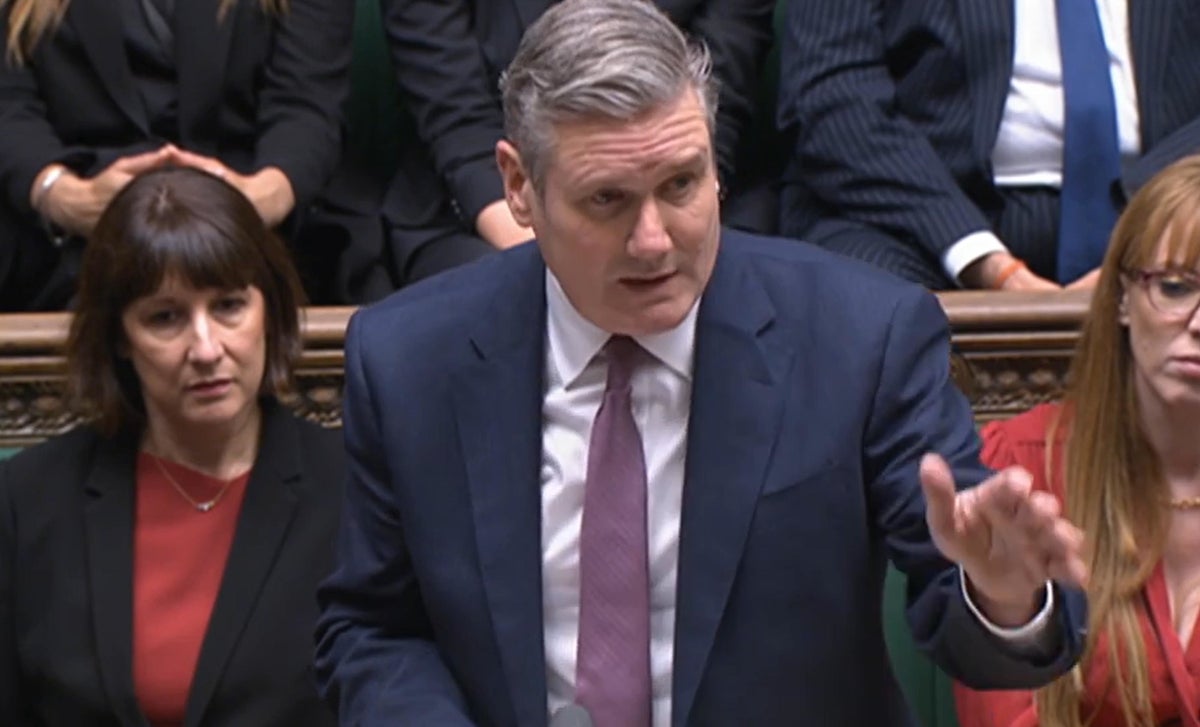
The House of Commons is voting on the King’s Speech on Wednesday, which was delivered by His Majesty King Charles III last week and laid out the legislative agenda the Conservative government plans to pursue during the present parliamentary session.
MPs are entitled to put forward their own amendments to the programme if they believe particular aspects of it do not sufficiently address their concerns.
If approved by the House speaker, Sir Lindsay Hoyle, these motions are then debated and voted on by the members.
One such amendment to be selected, put foward by Stephen Flynn of the Scottish National Party (SNP), urges that Parliament “join with the international community in urgently pressing all parties to agree to an immediate ceasefire” in Gaza following the outbreak of heavy fighting in the region after Hamas launched its deadly terror attack against Israel five weeks ago.
Mr Flynn’s appeal for “moral leadership” is unlikely to pass, however, because the chamber’s Conservative majority is likely to vote against it, preferring to endorse Israel’s right to defend itself in response to the events of 7 October.
What makes the vote so intriguing is that Sir Keir Starmer’s MPs have been explicitly ordered to abstain from supporting the SNP cause, whatever their personal sentiments, and back their party’s own amendment instead, which calls for “humanitarian pauses” in the conflict to allow for the delivery of aid and the evacuation of civilians but stops short of demanding a full ceasefire.
Speaking to LBC on Wednesday, shadow cabinet minister Pat McFadden insisted there was “no need” for any Labour MP to support the SNP’s amendment.
Mr McFadden says Labour’s competing motion “deals with the three critical aspects of this, which are: how this began on 7 October with the greatest slaughter of Jews since the end of the Second World War; it deals with the current humanitarian situation unfolding in Gaza, calling for pauses in the fighting for more aid for more electricity, water, medicine to get into help the people there; and, critically, it also deals with the future.
“And in setting it out in a comprehensive way, just as Keir Starmer did in his Chatham House speech a couple of weeks ago, we have given a position that Labour MPs can vote for.
“There’s no need for any Labour MP or frontbencher to be voting for the position tabled by another political party when we’ve tabled our own position.”
An attempt to force party unity then, the vote could instead prove to have the opposite effect and expose the deep internal divisions within Labour over the war, raising the very real prospect of Sir Keir facing an open rebellion from his own side over his stance on Gaza, which some consider too moderate.
The SNP’s leader in Westminster Stephen Flynn— (PA)
That could mean he is forced to sack members of his shadow cabinet who do not comply with the whip for breaching party discipline, creating a leadership headache he could well do without as he bids to oust Rishi Sunak and become Britain’s next prime minister.
“This is a whipped vote and every MP knows what the consequence of that means,” a party spokesman warned in advance of the ballot.
For his part, Sir Keir has argued that a ceasefire would mean “Hamas would be emboldened and start preparing for future violence immediately” but that stance puts him at odds with the likes of Scottish Labour leader Anas Sarwar, Pope Francis, the Archbishop of Canterbury, Amnesty International and Save the Children, all of whom have called for an immediate end to the bloodshed on humanitarian grounds.
More than 65 Labour MPs – including 18 Labour frontbenchers – have already defied Sir Keir on the issue, almost 50 councillors have quit the party and more than 330 local leaders have urged him to change his position.
He has already been warned that the resignation of frontbencher Imran Hussain over the party’s refusal to back a ceasefire “won’t be the last” and figures close to him believe that as many as 10 Labour frontbenchers could break ranks on Wednesday.
Naz Shah addressing the Commons earlier this month on the need to ‘end bloodshed’ in Gaza— (PA)
Naz Shah, shadow minister for crime reduction, has already indicated her intention to support the SNP’s ceasefire call.
“Our values push us to do better and this is why despite all the risk to our personal positions we must do what is right,” she said on Wednesday.
"Whilst it may be a matter of convention to follow our closest ally, the US, in interests of foreign policy, it is a matter of conscience to step away from our closest ally in the interests of peace.
"We know that eventually there will be a ceasefire in this current crisis, every war ends with a cessation of hostilities. The question is not if there will be a ceasefire but when.”
The strength of feeling surrounding the war was already seen in the Commons earlier on Wednesday when a group of protesters bearing “Ceasefire now!” placards interrupted a speech by shadow home secretary Yvette Cooper.
Sir Keir could be in for a long night.







